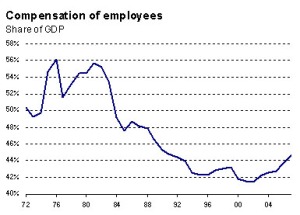Sorry, no conspiracy here
The Standard(*), No Right Turn(*), and Hard News(*) have all commented on a graph showing the declining share of labour compensation in national output over the period 1981-2002. The claim/implication is that right-wing policies have contributed to the drop in labour’s share, and that the Labour government’s policies have reversed that trend somewhat in recent years. Does this explanation make sense?
Source: Stats NZ (national accounts)

